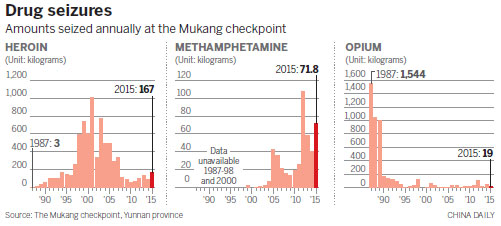Yunnan boosts efforts to stem trafficking

Experience and tact
Located on National Highway 320, which links the border city of Ruili with Shanghai in the east, the checkpoint is the only major contraband inspection station for the 2,000 vehicles that pass through every day, headed for destinations across China.
"We usually question the drivers and make preliminary examinations of their vehicles. A decision must be made immediately about whether to give them the green light or to ask them to pull over for a thorough examination. That requires a high degree of experience and tact," said Tan Haopeng, the 15th officer to command the checkpoint since it opened in 1978.
"We are aware of more than 400 ways of hiding and smuggling drugs, but some tricks can be very devious and surprising. The officers have to be vigilant with all the vehicles passing through our checkpoint because you can never predict the next new smuggling technique. "
Some are highly ingenious. In 2007, 800 grams of heroin were found inserted into a placenta a female passenger was carrying just hours after she had given birth.
"At first glance I wasn't suspicious about the items in the car. I decided to check the placenta because it seemed to be larger than normal. It turned out that packages of drugs had been inserted into the edges of the placenta," said Su Dan, the officer who made the discovery.
Traffickers are adept at using a range of everyday objects to transport drugs. Consignments of jade, vehicle water tanks and livestock have all been used as hiding places, while children, pregnant women and disabled people are frequently employed to carry consignments.
In September 2000, when police stopped a van carrying live ducks on the road from Mangshi to Baoshan, a city on the border with Myanmar, the officers discovered that a total of 116 capsules, containing 860 grams of heroin, had been inserted into the stomachs of five ducks.
The case was the first of its kind in China, but since then, officers at Mukang have discovered that there are dozens of ways of hiding drugs in the bodies of livestock and humans.
Zheng Zhaorui, a veteran narcotics officer, has spent more than 13 years at Mukang compiling journals about detection techniques. He always carries a notebook so he can record every new method he discovers during his daily inspections.
His 100-page notebooks have played an important role in the fight against drugtrafficking and have been used as examples in Narcotics Control, a textbook used in police academies nationwide.
Community projects
Yunnan's anti-drugs campaign isn't just limited to vehicle inspections. The officers have made great efforts to eradicate production and use in local communities.
Fapa village was once a drug hotspot. Many residents were addicts, while others were dealers, lured to the trade by the prospect of easy money. Although the village has still not fully kicked the habit, an 11-year campaign has greatly reduced drug use.
In 2005, the village was home to 147 users, so 10 armed officers from Mangshi were assigned to help a cleanup operation and improve the residents' lives through community projects. The number of addicts is now just 57.
The officers invited agricultural experts and technicians to the village to teach the residents to cultivate a variety of aromatic tobaccos. After several years of experiments on the farmlands, crop yields are high.
By the end of last year, 497 families had sown an area of 550,000 square meters with tobacco, and per capita income in the village had risen to about 8,000 yuan ($1,180) from 1,100 yuan in 2004.
Meng Liming, who has been stationed in the village, said he had to study hard over a long period before he could communicate with the residents, mostly members of the Dai ethnic group with their own language and unique customs.
Four sentences in Mandarin and the Dai language were written on a blackboard that hangs permanently on the wall of Meng's room.
"Although my colleagues and I began learning the language years ago, we are still learning it so we can better serve the local people. We do our best to help them solve the problems in their lives. I hope they will not be tempted into the drugs business anymore because we have seen how families can be destroyed if a member becomes an addict," he said.

















